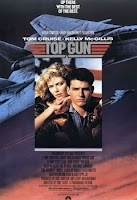 Directed by: Tony Scott
Directed by: Tony ScottWritten by: Jim Cash, Jack Epps Jr.
In the U.S. Navy, the best fighter pilots are sent to a special school in Mirimar, California - Top Gun - to hone their skills. Seriously. This movie, though, has both everything and nothing to do with that premise.
Maverick (Cruise) is a navy fighter pilot with an attitude and a bad reputation as being reckless. Fate intervenes, and he and his co-pilot Goose (Edwards) are given a chance to prove themselves as the best pilots in the country. To succeed, Maverick must both overcome the ghost of his father and control his feelings for his flight instructor Charlie (McGillis).
(Even that plot description is a stretch and gives a lot of credit to the film. But more on that later.)
"Top Gun," when taken piece by piece, is awful. But somehow, as a whole, it overcomes its inadequacies to become one of the definitive films of the 1980's. Tom Cruise's acting is a perfect example of the film's contradictory nature. Cruise is campy and hammy, but he's also charming (in a 1980's kind of way). The film is both action packed, but, considering that most of the missions are training, devoid of any real danger.
The songs on the soundtrack are awesome - until you realize that almost all of the music in the film is made up of variations on just three songs. (But then again, those three songs rock, so...)
Elements of the story come and go at the convenience of, well, the story itself. For example, Maverick is supposed to be haunted by the ghost of his father - who was, himself, one of the best fighter pilots of his time, and who disappeared mysteriously on a mission. But, this fact only comes up at random times to explain his behavior within a certain scene, and is abandoned the moment his behavior is different. It's even easy to argue that he is more haunted by his former co-pilot than his father. At times, Maverick's romance with Charlie must be kept a secret from everyone (lest a conflict of interest arise), but at other times they are completely out in the open with their relationship. Baffling, yes; problematic, not really.
Just as Maverick is all torn up inside, so am I in how I feel about this film. I both laugh at and fall in love with "Top Gun." And you should too!
(Please note: I've avoided any interpretations that delve into any depth on the film. But there is potential. It could be a propaganda piece for the military strength of the US in the face of the eminent collapse of the Soviet Union. It could be an examination of the modern American military conscience, needing to overcome its failures in the Vietnam conflict. It could be an examination of masculinity in a hyper-masculinized world. Those are all there. But yeah, I'm not getting into any of those here.)







